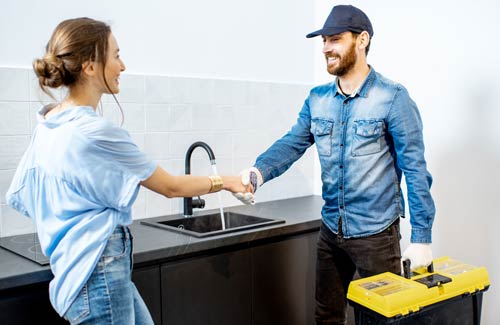4 Ways to Help Your Plumber Succeed

When you call a plumber to your home, you usually have a problem that you want dealt with as quickly as possible. While most plumbers hope to complete every job promptly and efficiently, a lack of information can sometimes be an impediment. The more you know about your home's plumbing, the better equipped you will be to help your plumber get the job done right.
Below, you'll find four simple ways that you can help your plumber to fix problems in your home with as little time and cost as possible.
1. Locate and Check All of Your Shutoff Valves
Most homes will have shutoff valves at each fixture. You should have one valve near every sink and toilet in your house. In most cases, you can find the shutoff valves for your sinks inside cabinets or vanities. For your toilet, check the wall behind the tank. In addition to these individual valves, your home should also have a main shutoff in your basement or utility closet.
Knowing the location of each valve can help you to direct plumbers where they need to go quickly. Additionally, you can use this knowledge to shut off leaky fixtures before your home suffers significant water damage. Since shutoff valves can fail with age, check each one for proper operation once or twice per year.
2. Avoid Chemical Drain Cleaners
Over-the-counter drain cleaners may seem like a panacea, but they can often make a plumbing problem even worse. Not only do these cleaners contain harsh and potentially dangerous chemicals, but they may also damage your pipes. If the cleaner fails to clear the clog, then you will have caustic chemicals sitting inside of your drainpipe.
When you try to clear a blockage, stick with non-toxic home remedies and mechanical methods such as plunging. If you do use a chemical cleaner and then later call in a professional, be sure to inform them. Keeping your plumber aware will help to save them from potential injury, since drain cleaners may splash back.
3. Keep Utility Areas Clean
Nobody expects a perfectly clean and organized home, but keeping a few critical areas clutter-free can significantly simplify your plumber's life. Make sure that plumbing appliances such as your water heater and furnace are easily accessible, and consider occasionally dusting and removing cobwebs. Likewise, always make sure that nothing blocks access to your home's main water shutoff.
Making these tasks a part of your regular cleaning can help to ensure that your plumber can get where they need to go in an emergency. If disaster strikes, you likely won't have time to do emergency cleaning in these areas. Ensuring that they remain free of significant blockages will allow your plumber to immediately begin solving your problem rather than negotiating a complex maze of clutter.
4. Ask Questions
The best way to help your plumber is also one of the easiest: ask questions. Your plumber is a skilled tradesperson, and they want you to be happy with their work. If you are at all concerned about cost, don't be afraid to ask about the likely outcomes for your particular plumbing situation. Although many plumbers won't be able to give you an exact cost upfront, they can often provide a reasonable estimate.
Asking the right questions can also help your plumber to understand your situation and needs better. Discussing your budget, options for quick fixes versus long-term solutions, and any other concerns you may have can all help your plumber to decide on the best way to approach your particular plumbing issue.
Whatever your plumbing needs happen to be, you can rely on Express Plumbing & Drain to help you deal with them. Give us a calltoday to set up your appointment.





